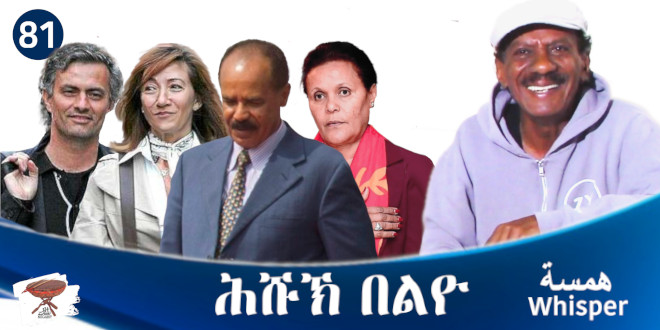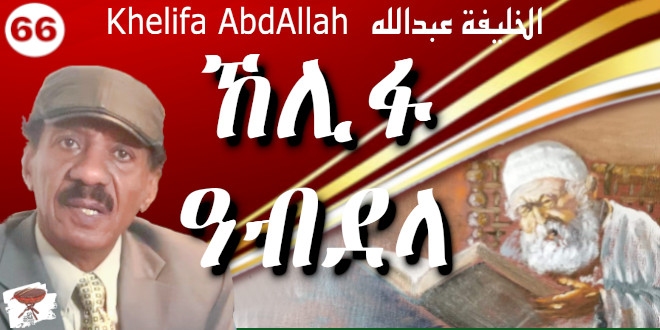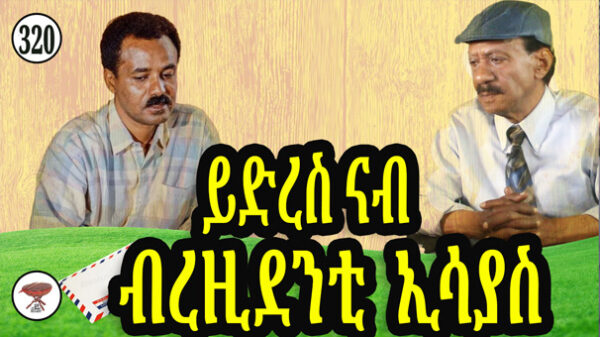Ufficio Lavoro, Worker’s Union & Labor Party
A laborer, a worker and a proletariat may be interchangeable words, if you are innocent. But as you progress from one to the other, you notice that the involvement of the politicians who claim to speak on behalf of labor ranges from zero to one hundred percent; from the practical to the abstract; from the focused to the fuzzy; from one that empowers labor to one that takes a frontal assault on religion. It is the mindset of the Labor Party, actually the rigidity of its remanants, and not the mindset of the religious activists, that account for most of the polarization of Eritrean politics. There are more bigots and extremists in the “secular” camps than there are in the religious and ethnic based camps. Follow me and I will attempt to show you.
When I was a just a child, I remember visiting the premises of Uffico Lavoro, a cozy villa tucked behind Albergo Sicilia, to deliver a message from my father to its manager Am Saleh Habbash. Later on I came to learn that Ufficio Lavoro looked after the interests of the employees and employers and arbitrated between them to resolves their disputes. Ufficio Lavoro relied on the law and common sense to mediate and solve disagreements that arose between employee and employer.
.
When I joined the ELF, I came to learn of the Workers Union. Its leader, Ali Hnti, explained to a group of raw youngsters (myself amongst them) the mission of the Workers Union in the liberation struggle. I had asked Ali Hnti if the Workers Union was similar to Am Saleh Habbash’s Ufficio Lavoro. “The Ufficio Lavoro institution is already dismantled, Saleh Habbash was probably the last person who protected the rights of workers,” he had said.
We had dispersed to cook lunch when suddenly Ethiopian MIGs thundered above and bombed our location. The MIGs had burned a makeshift hut from inside which ammunition cracked like popcorn. We laughed thinking that was the only damage. We thought the MIGs bombed for about fifteen minutes and burned just a makeshift hut. Moments later we discovered a terrible loss: the MIGs had killed Ali Hnti.
The Workers Union was a “mass organization” whose purpose was to organize and empower Eritrean Workers. In the 1940s, it was Eritrean workers who formed their own union to call for strikes demanding their rights. But in the 1970s, it was the “vanguard” fronts—the ELF and EPLF—who would take the place of the union organizer and call for the agitation. In time, both came to learn that there wasn’t sufficient number of “Serahtengatat” and “Ummal” and they would join this mass organization with another.
Eventually, I came to learn of the Labor Party (LP.) When people mentioned the LP, I thought they were referring to Ali Hnti’s Workers Union though I didn’t understand why many whispered the name. In time I came to understand that LP was a clandestine clique on the driver’s seat of the ELF: it decided who was appointed where, who was promoted, demoted, jailed, and what the cadres should preach. In time I also came to know that Isaias’ EPLF had its own secret clique, the Peoples’ Party.
Once the shocking behind the scene machinations of the LP were revealed to me, I understood why some combatants abhorred the clique and others cloaked it with an aura almost divine. The LP didn’t banish God alone, it expelled poor old Mao as well, anointing the thick bearded Marx and Lenin. That created confusion among the combatants and naturally there appeared acute, irreconcilable differences of thoughts, goals, and motives. Soon, two major conflicts ensued—on the first one, two groups fought to own Marx, the LP came out victorious. The LP didn’t want to loosen the reign of control as the other group (just like the current sloganeering of democracy within the opposition) agitated for what they believed to be democracy in an undemocratic way. I couldn’t understand any of it because my understanding of democracy, besides using it as a slogan, is very limited—I am inspired more by “justice” than “democracy.”
Ask those involved in that conflict (at your own peril, if you have the time) and they will talk for hours to no end about their idealism and how the reactionaries blocked their reformist agenda. What they will not tell you is that they were militantly opposed to anyone who didn’t worship their demigods, Marx and Lenin, and the fight was about who would keep the keys to Marx’s shrine.
.
The LP reaffirmed its ownership of the shrine and the first confrontation between those whom I would generously call idealists (known as Fallul) and the LP, came to a tragic end. The LP braced for yet another bloody internal battle, this time it targeted those who would not bow to Marx and Lenin. The LP called them Yameen—our people said, n’yeman yemrahanna, wishing that God would lead them to the right—traditional Eritrea didn’t want to be on the left. But the LP eradicated the Yemeen and it reaffirmed its control of the Marx shrine.
The two problems cleared, the LP began to devour its own and could not defend itself from the joint EPLF/TPLF assault; a tragic end was inevitable. The LP character, however, stubborn as it is, refused to lie down and die in peace. It revived itself in the form of vanguard attitude—refusing to be part of the Eritrean political body but insisted on acting as the head of anything Eritrean. And we come to the era of slogans: Democracy! Secularism! And many empty rhetoric posturing. Empty. Just like a hallow gourd. But one thing that has persisted with the remnants of LP (and its equivalent in the EPLF) is hostility towards religion and to eye with suspicion anyone who worshipped an eternal God. Worshipping human gods, like Marx, Lenin, Gandhi, Mandela is encouraged and may even earn you the timeless honorific title of gesgasi (progressive) or even moderno!
Reclaiming God
My generation had left Eritrean towns and countryside to join the rebellion when God was still there, greetings were answered with humble “Egzabher Ymesgen,” or “AlHamdullilah.” On top of the two organizations’ assault on God, the Derg had also conspired against the pristine Eritrean culture; God was replaced by the bearded mortals who were long dead. Quickly, these traditional greetings were gone—How are you? Sernay. How are you doing, Grm. How is your family? Werqi.
But every revolution has a counter revolution. You must have noticed the way the younger generation respond to greetings: Amlak Ymesgene. AlHamdullilah. Kbru Yesfah. MashaAllah.
Without fanfare, the tradition re-imposed itself. Even veteran combatants of the seventies and eighties who swam in the waves of atheism are today leading church organizations—rebuilding a religious community. You find them in mosques looking content and reciting the Koraan. Christians and Muslim have reclaimed God, they brought Him back from banishment; and the Eritrean society, despite the assault of the PFDJ against their faiths, are maintaining their religious characters—a prelude to reclaiming their religious rights, assertively.
But this comes at a cost: those of you who go to church are relatively safe, there is no label invented by the bigots to assault you, at least until now. If you are a Muslim, be prepared to be called an extremist, even if you do not pray (though I strongly urge you to, you never know, consider it an insurance.) If you are a Muslim, your name is enough to earn you that label by the bigots.
Secularism, an Irony.
Today’s faithful are the only secular people in Eritrea. The regime has become the Synod and the Dar AlIfta’a with Yeftahe Dimitros on the helm, while the faithful are calling for the separation of the state and religion. But the “secular” PFDJ has adamantly refused to take its hands off religious institutions.
The interference in the Orthodox Church is well documented and publicized but the Muslim problems are hardly public. For example, the Muslim mufti is PFDJ appointed, almost a decade before they appointed the Orthodox Patriarch. The Mufti is one among a few compromised and blackmailed individuals who run the Mosque as a PFDJ wahio branch. Friday sermon are no more preached by independent imams, it actually is issued from the office of Yeftahe, or is checked by him, before it is copied and distributed to the mosques on Friday morning. By noon, all the major Mosques preach from the same copy, struggling to read what they have not written and didn’t memorize enough.
Have you noticed that those who are loudly condemned as extremists are behaving composed and calm; while those who try hard to be perceived as calm and wise make the loudest noises? Observe the regime, the opposition and the resistance camps and you will find those who claim to be secularists are more of bigots but those whom they brand as extremist religious people are behaving responsibly.
.
Secularism is an irony: in today’s Eritrean landscape, the religious have become the exponents of secularism and those who claim secular values have become bigots. For the religious, secularism is the guarantee they need to practice their rituals unhindered; it is the only guarantee that would protect them from the PFDJ and those who espouse the same values (not the same crimes). It is with this in mind that one can easily deduce that secularism has become the demand of many religious persons; they have come to understand that their religious freedoms can only be protected under a secular system. But the fake secularists promote it with the aim of advancing their bigoted agenda: to banish religion, to separate people from their God, so they can replace Him with their favorite demi-gods.
And that is a clarion message for those of you who aspire for elections and public positions. Take note: there is not a chance in this world that any Eritrean would ever elect an atheist, let alone a bigot. In Eritrea there is a revolution in the making, unlike the old revolution, there is a spiritual awakening. Take a careful note. It is not enough to wave programs and to claim that you have changed while using the same hostile language used by the Labor Party of yesteryear against the faithful: the people have a right to insist that whoever aspires to lead them be righteous and understands the importance of religion in the lives of the people.
Are We Forgetting the PFDJ?
Never. The PFDJ is the Ayni Be’eray, the bulls eye, as they say. It is not only a clique, it is a thought. It is an attitude. It is a political culture that must be eradicated. The PFDJ is also a weed.
Weed?
Right. A weed, even after it’s uprooted, leaves behind tiny seedlings that might sprout into another weed. You must have cleared weeds around your house or in a farm and stretched your hands proudly, contented that you have eradicated it only to be surprised by new sprouts. Weeds do not die easily; they lurk under the surface. Therefore, one has to reach deep, remove a sizable amount of contaminated dirt from around the roots and discard it far, or bleach it with a merciless chemical. Contaminated dirt? Strange as it sounds, some dirt are dirtier than dirt. That is how I look at the PFDJ. Unless it is totally uprooted, its remnants would sprout and all the struggle would amount to nothing, just wasted years and forgotten dreams. If one is going for cosmetic surgery, visit Hollywood doctors; If you are poised to eradicate the weeds from the root, then be unambiguous. Clear. Focused. Don’t waiver or wobble.
By no means am I saying the Labor-Politics is equivalent to dirt, I am saying its thoughts are equal to contaminated dirt. I haven’t read the obituary of the cliques and I suspect its children are keeping its spirit alive—at least in its romantic aspects. Back then, they hated God more than they hated the Derg. Or so I thought. The same tactics that were used to banish God are now being used to advance chauvinism and bigotry—yesterday the cloak was national unity, today it is the same mantra. And here is my Acid Test that I have divulged to several friends before:
I challenge everyone who has a cell phone to check the address books on their cell-phones (for some, mobiles) and tell themselves how representative of a united Eritrea the list of names they call are. No cheating, family and work colleagues do not count. Then, once you discover the ugly reality that your list of acquaintances doesn’t say much about Eritrean unity, stop preaching and admit the polarization. Those who are lucky enough to have diverse names in the list, God bless you—preach about national unity to your heart’s content, you have earned that right.
I know, as usual, this would help some contemplate and cause others to send me angry e-mails—it’s painful to be told you are a hypocrite.
But those who already realize this problem and are already working to ameliorate it, you just need to keep struggling for a saner political environment.
Loqmats
The times have changed and now we can understand the strange alliances of graying political riffraff: ex-Derg operatives, outright bigots and chauvinists refusing to die out. The Amhara have a saying for that, Al Mot Bay Tegaday.
I have nothing but disappointment on how some people have internalized failure and have become paranoid. Yet, they hide their failure by maintaining the image of their previous self: confrontational, condescending, arrogant and accusatory; but they fail in hiding their weakness, a weakness that always leads them to forge questionable alliances. I despise those who jump ship at the last moment: from Haile selassie, to Derg, to PFDJ, to opposing the PFDJ. Some call a person who jumps ship at the last moment, pragmatic. I prefer to call that person, loqmats. Or, if you will, loqmatsatic.




Awate Forum